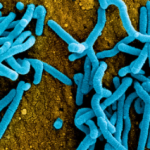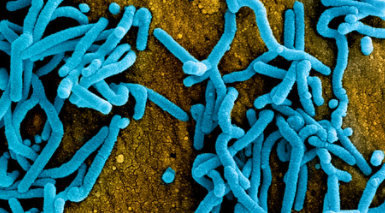
Colorized scanning electron micrograph of Marburg virus particles (blue) both budding and attached to the surface of infected VERO E6 cells (orange). Image captured and color-enhanced at the NIAID Integrated Research Facility in Fort Detrick, Maryland. Credit: NIAID
For the first time ever, Marburg virus disease has been confirmed in West Africa. The case was reported by health authorities in Guinea’s southern Gueckedou prefecture, where the country’s latest Ebola outbreak was declared over less than two months ago. Guinea is currently dealing with a third wave of covid-19 cases.
Guinea’s health ministry said that on 25 July the patient arrived at a local clinic in the Koundou area of Gueckedou for treatment and a medical investigation team was dispatched to investigate his worsening symptoms, including fever, headache, fatigue, abdominal pain and bleeding gums. He died on 2 August. A field laboratory in Gueckedou collected samples from the deceased patient and Guinea’s national haemorrhagic fever laboratory confirmed he had Marburg virus. The Pasteur Institute in Senegal also confirmed the result.
Described by the World Health Organization (WHO) as a highly infectious virus that causes haemorrhagic fever, Marburg belongs to the same family as the Ebola virus.
Matshidiso Moeti, regional director for Africa at the WHO, noted that the ability of the country to quickly stem the spread of the disease largely relies on local health authorities and health officials being able to quickly detect the disease. Response to the outbreak is being built on Guinea’s past experience and expertise in managing Ebola, which is transmitted in a similar way, Moeti said.
The most recent outbreak of Marburg virus occurred in Uganda in 2017 during which three cases were confirmed. All three patients died. In 2005, the largest documented Marburg outbreak occurred in Angola, with 329 people dying out of a total of 374 cases.
While vaccines and some treatment options are now available for Ebola, there are none approved for Marburg aside from supportive care, including rehydration and treatment of specific symptoms.
The government of Guinea said it is working with its partners to quickly implement contact tracing in order to find anyone who could have been in contact with the man who was confirmed to have contracted Marburg virus. It is also introducing public education and enlisting community members to raise awareness, as this is the first time that the disease has been recorded in the country.
WHO said it already has a team of infectious disease experts in the area, and that cross-border surveillance is being enhanced to quickly detect any cases, with neighbouring countries on alert.
“The Ebola control systems in place in Guinea and in neighbouring countries are crucial to the emergency response to the Marburg virus,” said a WHO statement.
Source: New Scientist

















